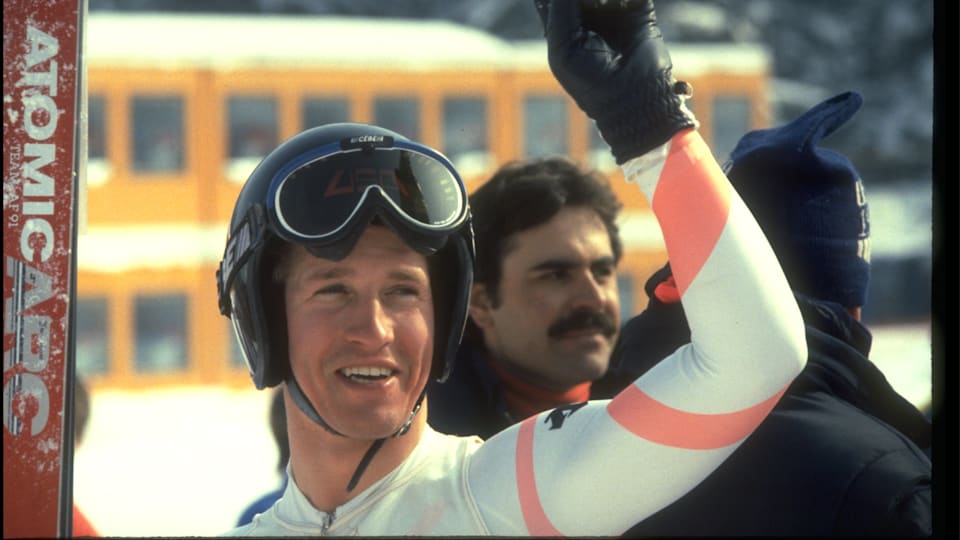Too fast to be afraid: Bill Johnson, a life skiing on the edge
Behind the first US gold medal in Alpine skiing is an incredible story, and not only about sport - discover Bill Johnson, the maverick skier who won America's first Olympic title, at Sarajevo 1984.

At the beginning of the Eighties, despite an excellent third place in the overall medals table at the 1980 Olympic Winter Games, the US was still trying to win its first Olympic gold medal in Alpine skiing.
Not even the “home-court” factor in Lake Placid had given a boost to the US team that year. Only Phil Mahre had managed to get on the podium in the men's Alpine events (a gold medal in the combined - not yet an Olympic event and valid only for the World Championship result, which doubled up with the Olympics that year – and a silver medal in the slalom), and Cindy Nelson, the only woman to win a medal, silver in the women's combined.
The usual suspects from Europe, including Sweden's Ingemar Stenmark in the men's event and Lichtenstein's Hanni Wenzel in the women's, were the stars.
A much-awaited medal
At the 1984 Sarajevo Olympic Winter Games, Bill Johnson was not yet 24 years old, and it was his first Olympics. He was a slim blond man from California, with a restless character and more of a surfer vibe than skier but exuding confidence typical of the most experienced veterans.
Despite having been part of the Alpine ski team for some years, he did not achieve significant results until that season. In Wengen, Switzerland, less than a month before the Sarajevo Games, he claimed his first victory in the prestigious World Cup series downhill event, showing great courage on his astonishing run.
Having led an attacking race on the snows of the Lauberhorn, in the final stretch of the slope he almost lost balance after landing a jump but, instead of falling, he managed to turn the mistake into an unlikely victory.
Not bad for a boy who had turned to skiing in order to escape the fall-out from stealing a car.
Bill's first major crossroads materialised at the age of 17, when he was put on trial after trying to steal a Chevrolet.
However, the judge empathised with the rowdy blond and proposed to commute the sentence with activities to be carried out at the local ski school. It is because of this concession that Johnson ended up turning pro.
Even after his stellar gold, Johnson himself revealed the key to his attitude, which almost doubles as a rule of life for him: “There is a fine line between being on the edge and out of control, but that’s part of the ski race. You have to be skiing on the edge to win.”
Pioneering ways
After Wengen, Johnson began to make plans to upset the European Alpine skiing elite at the upcoming Games.
Asked by journalists about the US rookie, Franz Klammer, the “Kaiser of Austria" after winning a gold medal in Innsbruck 1976 called Johnson a “nose picker”. Not exactly a sign of respect, Klammer warned: "If he wants to win, he will have to ski very well."
Johnson offered his own reposte: "Each of them is competing for second place," he said.
The Yugoslavian downhill race had all the makings of a hot event.
When the day arrived, on 22 February, 1984, Johnson demonstrated technique and confidence in jumps and speed peaks in a pure mastery of the downhill slope, bending as if he were made of rubber, slicing through the air and landing hard on the track of Bjelašnica. He succeeded in winning Olympic gold with apparent disarming ease. It was 1984, and he was the first American man to stand on the top of the Alpine skiing Olympic podium, at his first - and last - Games.
Skiing is life
The Olympic champion tried to make the celebrations last to the bitter end. When asked by journalists "What is the value of an Olympic medal?" he winked and replied: "Millions." Johnson would also enjoy the trappings of a new Porsche, a house in Malibu, making guest appearances on TV, parties, and various other excesses.
After his success in Sarajevo, Johnson would progressively distance himself from skiing, however. Between injuries and lack of dedication, he missed the call of Calgary 1988. He became a father three times over with his wife Gina Ricci, before experiencing the pain of losing a child, when 13-month-old Ryan drowned in a hot tub in 1992.
When the merry-go-round stopped, after almost 20 years on from retiring, Johnson attempted to return to skiing – the source of his fortune and in an attempt to win back his wife, from whom he'd since been divorced.
He returned to training, setting the 2002 Salt Lake City Winter Olympic Games as his goal, unconcerned that he was now 40 years old. But this attempt will change his life again, this time irreversibly. An accident, in 2001 - at the national championships in Montana – inflicted lifelong brain injuries that left him in need of care for the rest of his life.
Nevertheless, he was a torch bearer at the Opening Ceremony at Salt Lake 2002, alongside Mahre, declaring when asked the question, was it all worth it: "Definitely".
By 2013 he refused any more therapeutic treatment for his ongoing issues, which included a number of mini strokes and a life-threatening infection, dying three years later.
"I love skiing and I will always want to ski because skiing is my life," he would say, even when it meant being barely able to whisper it.
